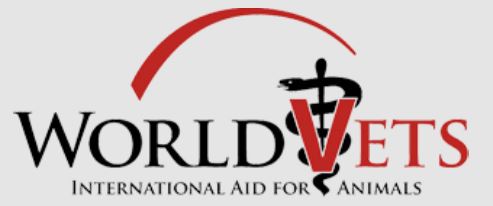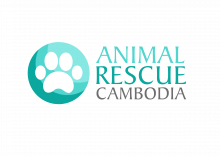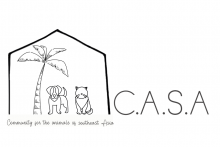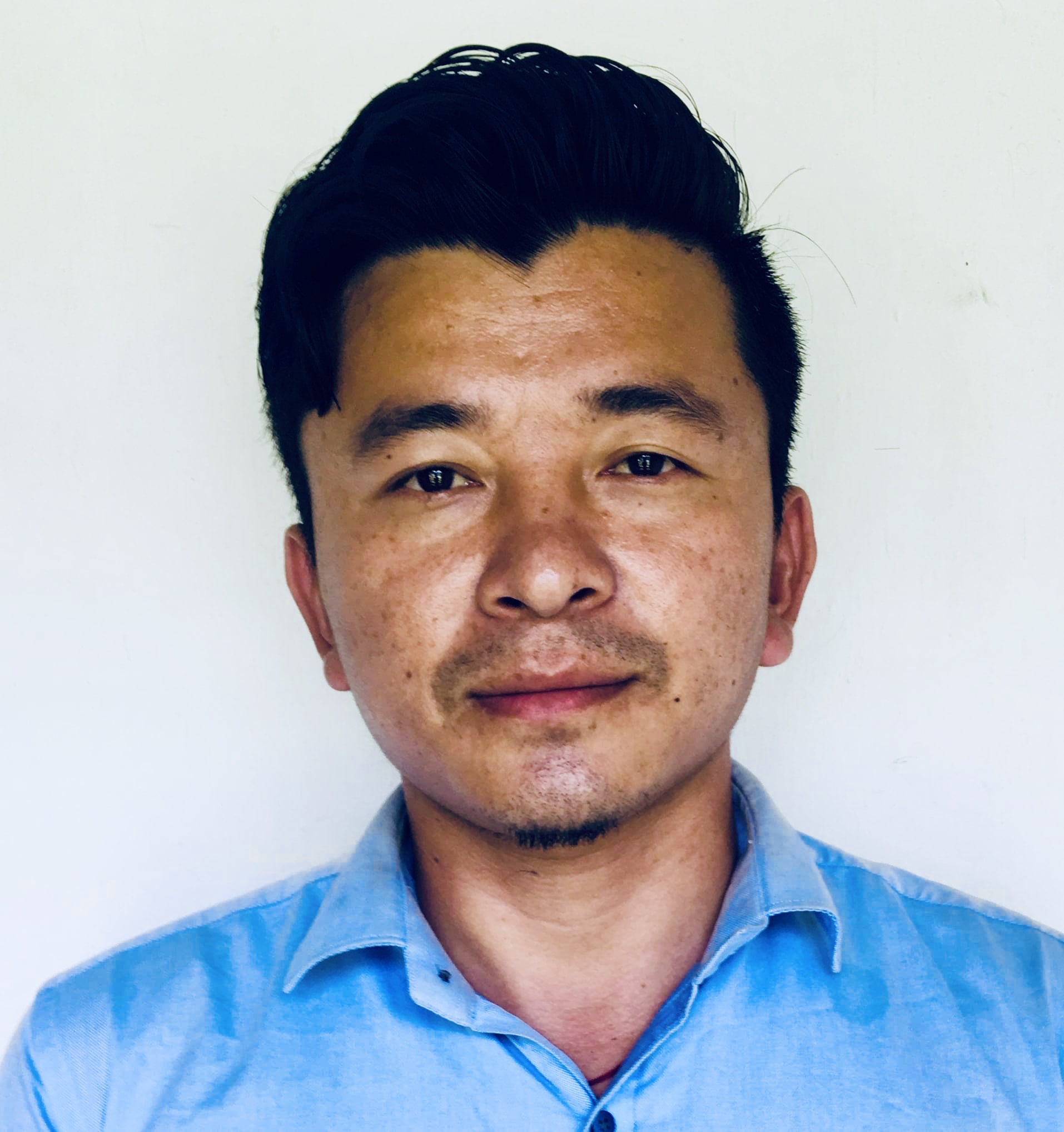 World Vets provides veterinary aid in many countries throughout the world and World Vets staff and volunteers have been contributing to the CTVT sample collection since 2010. We are very grateful for their continuous support of our project!
World Vets provides veterinary aid in many countries throughout the world and World Vets staff and volunteers have been contributing to the CTVT sample collection since 2010. We are very grateful for their continuous support of our project!
 AMRRIC (Animal Management in Rural and Remote Indigenous Communities) is a not-for-profit charity that uses a One Health approach to coordinate veterinary and education programs in Indigenous communities. We are very fortunate that they have been supporting the CTVT project since 2009 - thank you!
AMRRIC (Animal Management in Rural and Remote Indigenous Communities) is a not-for-profit charity that uses a One Health approach to coordinate veterinary and education programs in Indigenous communities. We are very fortunate that they have been supporting the CTVT project since 2009 - thank you!
 Vets Beyond Borders is an Australian-based charity established by veterinary volunteers in 2003. It recruits volunteers and provides expertise for veterinary-based animal and public health projects in communities needing such assistance across the world. Thank you for your support of the CTVT project!
Vets Beyond Borders is an Australian-based charity established by veterinary volunteers in 2003. It recruits volunteers and provides expertise for veterinary-based animal and public health projects in communities needing such assistance across the world. Thank you for your support of the CTVT project!
 Animal Rescue Cambodia is a non-profit organization that works tirelessly to end suffering for dogs and cats on the streets of Cambodia. We are committed to sustainable and long-lasting change in Cambodia, and work closely with local communities. Our approach includes neutering, outreach and education to improve the quality of veterinary care.
Animal Rescue Cambodia is a non-profit organization that works tirelessly to end suffering for dogs and cats on the streets of Cambodia. We are committed to sustainable and long-lasting change in Cambodia, and work closely with local communities. Our approach includes neutering, outreach and education to improve the quality of veterinary care.
 The CASA Association aims to improve the welfare of domestic animals as well as build upon the human-animal relationship across different contexts. We currently have a pilot project in Bali, Indonesia and hope to expand our work not only regionally but also into the protection of endangered species and supporting the communities in which they live.
The CASA Association aims to improve the welfare of domestic animals as well as build upon the human-animal relationship across different contexts. We currently have a pilot project in Bali, Indonesia and hope to expand our work not only regionally but also into the protection of endangered species and supporting the communities in which they live.

Mayhew is an animal welfare charity working to improve life for dogs, cats and local communities - both in the UK and internationally. Through their international arm, Mayhew International, they address issues around free-roaming dog and cat populations and work to create safer communities for both animals and people.

Debbie Koenig is an RVT from the US and is the remote point of contact for the CTVT study. She has been a technician in small animal practice, taught as a vet tech instructor and currently works per diem for World Vets.
 Dr Natalia Ignatenko has been a small animal practitioner in Ukraine since 1996. Over the last few years, her interest has mainly been focused on oncology and endocrinology patients. She often encounters patients with the most unexpected extra-genital locations of canine transmissible venereal tumour (CTVT). Her interest in CTVT arose from her clinical work on this transmissible cancer, especially as it is not at all similar to any other existing tumours which she regularly treats. Natalia says that she collects CTVT samples for our research project with a huge interest and we are very grateful that she has been continuously working on informing her Ukrainian colleagues about the disease both personally and at a number of congresses!
Dr Natalia Ignatenko has been a small animal practitioner in Ukraine since 1996. Over the last few years, her interest has mainly been focused on oncology and endocrinology patients. She often encounters patients with the most unexpected extra-genital locations of canine transmissible venereal tumour (CTVT). Her interest in CTVT arose from her clinical work on this transmissible cancer, especially as it is not at all similar to any other existing tumours which she regularly treats. Natalia says that she collects CTVT samples for our research project with a huge interest and we are very grateful that she has been continuously working on informing her Ukrainian colleagues about the disease both personally and at a number of congresses!
 Dr Mirjam van der Wel grew up in Tanzania and graduated as a veterinarian from Utrecht University, the Netherlands, in 1999. After more than a decade in private practice (mostly in the UK) she moved to South Africa and joined the Animal Anti Cruelty League, Port Elizabeth, South Africa, in 2010. As a welfare vet, Mirjam frequently comes across CTVT cases (something she had never previously seen!). Although some animals are successfully treated, many more are put to sleep. Collecting the TVT biopsies makes this sad situation more meaningful and we are very grateful for her continuous support of our project.
Dr Mirjam van der Wel grew up in Tanzania and graduated as a veterinarian from Utrecht University, the Netherlands, in 1999. After more than a decade in private practice (mostly in the UK) she moved to South Africa and joined the Animal Anti Cruelty League, Port Elizabeth, South Africa, in 2010. As a welfare vet, Mirjam frequently comes across CTVT cases (something she had never previously seen!). Although some animals are successfully treated, many more are put to sleep. Collecting the TVT biopsies makes this sad situation more meaningful and we are very grateful for her continuous support of our project.
 Mr Jack Reece qualified as a veterinary surgeon from Liverpool University Veterinary School in 1994. After nearly 4 years in rural practice in north Devon he took a voluntary post at Help in Suffering in Jaipur, India. Despite attempts to leave he remains there where he is involved mainly in a rabies and street dog control (ABC) programme. With Indian colleagues and others he has collected data on street dog ecology, populations and the effects of the ABC programme, some of which has been formally published. Jack has participated in a number of rabies and international conferences, was an expert at the FAO Consultation and is interested in all aspects of street dog biology including TVTs. Jack has been involved in the TVT project since 2011 and we are enormously grateful for his continuous support and contribution!
Mr Jack Reece qualified as a veterinary surgeon from Liverpool University Veterinary School in 1994. After nearly 4 years in rural practice in north Devon he took a voluntary post at Help in Suffering in Jaipur, India. Despite attempts to leave he remains there where he is involved mainly in a rabies and street dog control (ABC) programme. With Indian colleagues and others he has collected data on street dog ecology, populations and the effects of the ABC programme, some of which has been formally published. Jack has participated in a number of rabies and international conferences, was an expert at the FAO Consultation and is interested in all aspects of street dog biology including TVTs. Jack has been involved in the TVT project since 2011 and we are enormously grateful for his continuous support and contribution!
 Dr Sanjay Singh qualified from Rajasthan State Veterinary University in 2016. Apart from an initial brief spell in private practice in Delhi, he has worked as a veterinary surgeon at the animal welfare charity, Help in Suffering in Jaipur. His main professional interest is surgery, and he undertakes much of the surgical, managerial and monitoring work associated with the charity’s street dog and rabies control programme, including diagnosing and treating TVT in street dogs, and sampling cases for the Cambridge TVT Group. He also attends the charity’s rescue, private and equine cases and is happiest when operating on any species. In 2018 he undertook a study tour of UK veterinary practice and visited the TVT Group in Cambridge. He presented a paper on the Jaipur street dog work at the 3rd ICAM Dog Population Management conference in Kenya in 2019.
Dr Sanjay Singh qualified from Rajasthan State Veterinary University in 2016. Apart from an initial brief spell in private practice in Delhi, he has worked as a veterinary surgeon at the animal welfare charity, Help in Suffering in Jaipur. His main professional interest is surgery, and he undertakes much of the surgical, managerial and monitoring work associated with the charity’s street dog and rabies control programme, including diagnosing and treating TVT in street dogs, and sampling cases for the Cambridge TVT Group. He also attends the charity’s rescue, private and equine cases and is happiest when operating on any species. In 2018 he undertook a study tour of UK veterinary practice and visited the TVT Group in Cambridge. He presented a paper on the Jaipur street dog work at the 3rd ICAM Dog Population Management conference in Kenya in 2019.

Dr María Verónica Brignone graduated from the faculty of veterinary sciences at the Universidad de Buenos Aires in 2003. She is a specialist in oncology and small animal medical clinic. She is a professor of veterinary medicine and postgraduate studies. She gives lectures in Argentina and on abroad. She is a founding partner of Argentinian veterinary society and member of the executive committee. Her main professional interest is to help animals with cancer and their family.

Professor Francisco Pedraza-Ordoñez holds an undergraduate degree in Veterinary Medicine and Animal Pathology Specialist (Universidad de Antioquia, Medellín, Colombia), Master’s and Doctorate Degree in Veterinary Pathology (Universidade Estadual Paulista, Unesp, Sao Paulo, Brazil). Currently he is a Titular Professor in the Universidad de Caldas, Manizales, Colombia; where he has two main lines of research, one in neuropathology and the other in neoplasms of domestic animals. In the latter, he has worked on the biological behavior of the transmissible venereal tumor for many years, with special interest in the activity of the immune system to the evasion of tumor. Participation with the Transmissible Cancer Group at the University of Cambridge has been fundamental in the formation process of several undergraduate and post-graduate students in Colombia.
Professor Fekadu Regassa is an Ethiopian, he works and lives in Bishoftu town, Ethiopia. He is a professor at Addis Ababa University, College of Veterinary Medicine & Agriculture. He held his PhD from Royal Vet College, UK, in Sept 1999. Areas of his research and teaching are reproductive physiology & pathology. He practices in both large and small animal medicine.

Prof. Cristóbal Briceño is a veterinarian from and lecturing at University of Chile in Santiago, Chile. He conducted his PhD at Emmanuel College, University of Cambridge studying ecology, epidemiology and genetics in endangered endemic canid species from Patagonia. He is interested in wildlife conservation and their menaces and during his research has also focused in domestic animal health as a risk factor to native fauna. In this regard, he has been monitoring rural dog health in the places where he has conducted field work, such as Chiloé and Tierra del Fuego islands. Currently he is appointed professor at the Veterinary Faculty University of Chile where he continues research in these topics as well as international collaborations. He has been a CTVT project collaborator since 2012.
 Dr Mayra Martinez is a veterinary practitioner and researcher in Quito, Ecuador. Mayra has been a CTVT project collaborator since 2012, and she is currently working in projects related to CTVT that she hopes will unite different institutions, governments and veterinarians towards developing better methods for controlling and treating CTVT. She is also a regular volunteer in local animal shelters, where she provides veterinary support, training and lectures.
Dr Mayra Martinez is a veterinary practitioner and researcher in Quito, Ecuador. Mayra has been a CTVT project collaborator since 2012, and she is currently working in projects related to CTVT that she hopes will unite different institutions, governments and veterinarians towards developing better methods for controlling and treating CTVT. She is also a regular volunteer in local animal shelters, where she provides veterinary support, training and lectures.
 Dr Olga Glebova is a clinical pathologist from Moscow, Russia. She works in an oncology clinic and in a private laboratory that receives samples from different clinics all around Moscow and Moscow region. She is interested in the uniqueness of CTVT from the biological point of view and she loves looking at the CTVT cells under the microscope - her photos of CTVT cells are really amazing (you can have a look on our 'Home' page)!
Dr Olga Glebova is a clinical pathologist from Moscow, Russia. She works in an oncology clinic and in a private laboratory that receives samples from different clinics all around Moscow and Moscow region. She is interested in the uniqueness of CTVT from the biological point of view and she loves looking at the CTVT cells under the microscope - her photos of CTVT cells are really amazing (you can have a look on our 'Home' page)!
 Dr. José Rojas Gutiérrez is a dedicated private practice veterinarian since 2006. He owns the veterinary center "Clinica Veterinaria Dr José Rojas" in Los Andes city, Chile. Dr Rojas has been our collaborator since 2012 and in his own words he says "I'm proud to contribute to this amazing research and with this incredible experience. In Chile we have a lot of TVT cases because we have many dogs in the streets without owners, which is the main problem. The Clínica Veterinaria Dr. José Rojas aims to give advice to the owners and encourages spaying/neutering with the idea to control the dog population to reduce the prevalence of CTVT and other diseases."
Dr. José Rojas Gutiérrez is a dedicated private practice veterinarian since 2006. He owns the veterinary center "Clinica Veterinaria Dr José Rojas" in Los Andes city, Chile. Dr Rojas has been our collaborator since 2012 and in his own words he says "I'm proud to contribute to this amazing research and with this incredible experience. In Chile we have a lot of TVT cases because we have many dogs in the streets without owners, which is the main problem. The Clínica Veterinaria Dr. José Rojas aims to give advice to the owners and encourages spaying/neutering with the idea to control the dog population to reduce the prevalence of CTVT and other diseases."
 Dr Karter Neal is a general practitioner at the Santa Cruz Veterinary Clinic, Tucson, Arizona. Her experience is in equine medicine, general practice and in shelter medicine. Dr. Neal’s passion involves offering access to low cost care to pet owners. She is active with Soul Dog Rescue in the Four Corners region, volunteering at high volume spay and neuter clinics twice a year on the Navajo Reservation, as well as volunteering her spay/neuter services for the Hopkins Belize Humane Society in the Stann Creek district in Belize once a year.
Dr Karter Neal is a general practitioner at the Santa Cruz Veterinary Clinic, Tucson, Arizona. Her experience is in equine medicine, general practice and in shelter medicine. Dr. Neal’s passion involves offering access to low cost care to pet owners. She is active with Soul Dog Rescue in the Four Corners region, volunteering at high volume spay and neuter clinics twice a year on the Navajo Reservation, as well as volunteering her spay/neuter services for the Hopkins Belize Humane Society in the Stann Creek district in Belize once a year.
 Assistant Professor Bogdan Alexandru Vitalaru graduated from the Faculty of Veterinary Medicine of Bucharest in 2004, and he received his PhD in October 2009. Since January 2008, he is a University Assistant and from January 2016 Assistant Professor at the Faculty of Veterinary Medicine of Bucharest. Over the years he has participated in numerous scientific seminars and conferences and wrote more than 60 ISI and BDI scientific papers on topics related to breeding pathology, biotechnology in breeding, oncologic surgery, dialysis and hemodialysis. In 2012 he established Romanian Society of Minimal Invassive Veterinary Surgery.
Assistant Professor Bogdan Alexandru Vitalaru graduated from the Faculty of Veterinary Medicine of Bucharest in 2004, and he received his PhD in October 2009. Since January 2008, he is a University Assistant and from January 2016 Assistant Professor at the Faculty of Veterinary Medicine of Bucharest. Over the years he has participated in numerous scientific seminars and conferences and wrote more than 60 ISI and BDI scientific papers on topics related to breeding pathology, biotechnology in breeding, oncologic surgery, dialysis and hemodialysis. In 2012 he established Romanian Society of Minimal Invassive Veterinary Surgery.

Dr. Veronika Kravtcova qualified as a small animal doctor from Saint Petersburg Academy of Veterinary Medicine in 2005. She is a veterinary practitioner specializing in small animal oncology in a private clinic. She has been the chief doctor of the clinic for six years. Over the years he has participated in numerous scientific and practical seminars and conferences. She has some published works on oncology (AGRIS). She is members of the Institute of Comparative Oncology (bioirso) and the Russian Board of veterinary oncologists.

Dr. Rodrigo Horta is a dedicated veterinary surgeon and oncologist since 2010. He is a professor of the Department of Veterinary Medicine and Surgery in the Universidade Federal de Minas Gerais, Brazil. He did part of his doctorship in the University of Cambridge and is very proud to collaborate with the university and the CTVT study. "It´s been a lifetime experience". He is interested in biological behaviour and treatment of neoplasms, including the remarkable natural transmissible cancers.

Professor Doctor Sevil Atalay Vural, I graduated from the Faculty of Veterinary Medicine of Ankara University, in 1992; I received my PhD in June 1997 (about Rabies at dogs), Assistant Professor in April 2002, and Professor Doctor in 2008. Over the years I have participated in numerous scientific and practical seminars and conferences. I have a lots published more than 100 articles on topics related to oncology, and infectious diseases. I am also an auditor of the Republic of Turkey Ministry of Foreign Affairs Turkish Accreditation Agency.

Dr. Moisés Armides Franco Molina is a Veterinarian, with a master's degree in production with a specialty in animal reproduction and a doctorate in Microbiology with a specialty in Immunology. His main objective is the basic research and the clinical application. Lines of investigation: cancer, inflammation and cellular immunotherapy. Research and academic contributions: Dendritic cell and cell immunotherapy in the treatment of cancer, development and research of the IMMUNEPOTENT CRP, investigation of new compounds, nanotechnology and canine tumor venereal transmissible research. He works at the Laboratory of Immunology and Virology of the Faculty of Biological Sciences of the Autonomous University of Nuevo León, México. Where he has made multiple research articles, which have been published in international journals.

Professor Marcia Kikuyo Notomi graduated in Veterinary Medicine (1995) and obtained her master degree in Animal Pathology (1999) at UNESP, Brazil. She received her PhD in Clinical Medicine (2004) from University of São Paulo (USP), Brazil and she studied her post-doctorate in hematology (2014) at the Universidad Autonoma of Barcelona, Spain. Since 2009, she has been an Associate Professor of Small Animal Clinic and Clinical Pathology, at the University Federal of Alagoas. In northeast of Brazil, she found a high number of CTVT cases, some of which were atypical and aberrant. Therefore, she hopes to contribute with information from this region in CTVT research.
 I'm Dr Laura Delgadillo Keenan, I graduated as DVM from the University of Guadalajara in 1995, in Guadalajara city, México, and I have worked in my own small animal practice since 1997. The clinic has grown to a 24 hour hospital where we attend, dogs and cats and other exotic companion animals in general practice, where we do a lot of internal medicine (including oncology, cardiology and surgery). In our Hospital there are over 20 Veterinarians working in different areas. I have a diploma in different specialties, but have focused my work lately in ophthalmology, but as we have all kinds of patients, we do have patients with CTVT diagnosis, mostly street dogs that are rescued by someone. Some of those patients are lucky and receive treatment, others are euthanized because owners or rescuers don't want to do it. I started working with this research for several years now, and am very pleased to help with this illness.
I'm Dr Laura Delgadillo Keenan, I graduated as DVM from the University of Guadalajara in 1995, in Guadalajara city, México, and I have worked in my own small animal practice since 1997. The clinic has grown to a 24 hour hospital where we attend, dogs and cats and other exotic companion animals in general practice, where we do a lot of internal medicine (including oncology, cardiology and surgery). In our Hospital there are over 20 Veterinarians working in different areas. I have a diploma in different specialties, but have focused my work lately in ophthalmology, but as we have all kinds of patients, we do have patients with CTVT diagnosis, mostly street dogs that are rescued by someone. Some of those patients are lucky and receive treatment, others are euthanized because owners or rescuers don't want to do it. I started working with this research for several years now, and am very pleased to help with this illness.

I am Soheil Afshari-Behbahanizadeh, a 28-year-old Iranian veterinary practitioner. In early September 2018 I graduated from Azad University of Garmsar Iran (دانشگاه آزاد گرمسار ایران). My Doctor of Veterinary Medicine thesis was "Evaluating the effects of administering various doses of indomethacin on inducible nitric oxide synthase (iNOS) gene expression in breast tumor". During my undergraduate years, I undertook a 3month trainee course in Razi vaccine and serum research institute, Mycoplasma Laboratory Karaj, Iran. I passed 3 months of clinical externship in “Veterinärmedizinische Universität Wien” Austria, and likewise a month in “École Nationale Vétérinaire de Lyon” in France. In addition to that, I also passed a 12-month clinical rotation in my home university. In 2018, I joined to Prof. Elizabeth Murchison TVT laboratory. In this project, we identify to which CTVT clade the Iranian dog samples belong, and also define the number of mutations. The results provided interesting information about how CTVT in Iran differs from CTVT tumor collected from other countries. From the end of 2018 until now I am as a veterinary practitioner. According to my under graduate studies I found out that I am more interested in and fascinated with the world of immunology, genetics and cancer research.

Dr Samuel Uchenna Felix, a native of Abia State in Nigeria. Born and grew up in Kaduna State, Nigeria. I graduated as the best graduating veterinary surgeon at Ahmadu Bello University, Zaria, Nigeria in 2011. I began general practice of both small and large animal (ruminants) between 2012-2013. I received my MSc degree in Theriogenology ( Veterinary obstetrics and andrology) in 2017 from Ahmadu Bello University, Zaria, Nigeria. I am employed as a researcher and lecturerer with National Animal Production Research Institute, Ahmadu Bello University, Zaria, Nigera in 2014. I am profusely involve in researches on animal reproduction and reproductive endocrinology particularly of donkeys. I am also involves in reproductive surgeries and management of domestic animals. I am currently running my PhD (Theriogenology) on Circadian endocrinology of different age groups of donkeys in different seasons in Nigeria (at Ahmadu Bello University) and also I am a Fellowship student with the College of Veterinary Surgeon of Nigeria. I have participated in a number of conferences and seminar, and also have a number of published articles in peered review journal in areas of animal reproduction. My interest is reproductive biotechnology, reproductive disease management and endocrinology.

Dr Jo Olver is a '93 graduate of Western College of Veterinary Medicine. A mixed general practitioner now found at SPCA Fiji Islands. Dr Jo is lovin' life with her Fijian family and new menagerie, and the dedicated bunch at SPCA.

John Smith qualified as a veterinary surgeon from Liverpool University Veterinary School in 1978. After a couple of years practicing in Mtubatuba, Northern Zululand where he developed an interest in tropical diseases he returned to the UK. He became a partner in Bishopton Veterinary Group, a large mixed practice in Ripon, North Yorkshire, where he practiced for 30 years. Since retiring from the practice 5 years ago John has travelled annually to Maun in Botswana to work for the Maun Animal Welfare Society (MAWS). MAWS is a well-respected charity which, for over 20 years, has been vaccinating and sterilizing the local dog and cat population as well as providing much needed veterinary care for the pets of low-income members of the local community. John developed a great interest in CTVT cases which are frequently seen and treated at the clinic. He has found the research into CTVT fascinating not only for the numerous answers it has already provided but also for all the new questions on genetics and immunology that it poses.

Dr Yoenten Phuentshok grew up in Athang, a small hamlet in Western Bhutan and went to Pondicherry, India to become a veterinarian as Bhutan did not have a vet school. After graduation, he volunteered as a veterinary surgeon for the national dog population management and rabies control project (NDPMRCP) where he came across several CTVT cases in the free roaming dog populations of Thimphu, the capital of Bhutan. He then joined the Department of Livestock and after he was transferred to the National Centre for Animal Health as a veterinary epidemiologist in 2017, he started collecting samples for CTVT through the NDPMRCP. He is a recipient of the global award on rabies during the world rabies day in 2018 and he continues to work on rabies elimination globally.

Dr. Sheila K. Schmeling graduated from Colorado State University with a DVM and a MS in 1977. From 1978 to 1982 I worked for Fish and Wildlife in the USA. I have been a private veterinarian in Belize since 1982. For 25 years I was the veterinarian for the Belize Zoo. Since turning 65 I gave up livestock practice and only do dogs and cats.

Dr. Chandrindu Abeykoon graduated with BVSc (First Class) in 2018 from University of Peradeniya, Sri Lanka. Immediately after graduation he joined the academic staff of the Department of Veterinary Clinical Sciences, Faculty of Veterinary Medicine and Animal Science, University of Peradeniya. In addition to imparting his clinical knowledge and skills to veterinary undergraduates, he is discharging his services as a clinician in the Companion, Wild and Zoo animal section of the one and only Veterinary Teaching Hospital in Sri Lanka. He is involved in research in Animal Genetics and Veterinary Internal Medicine. His major interests are on Endocrinology, Nephrology and Oncology.
Karma Phuntsho is a veterinarian from Bhutan currently working at the National Veterinary Hospital in Thimphu. He has a degree in veterinary and animal sciences from Pondicherry University, India, and a master's degree in veterinary medical sciences (specialisation in animal health economics) from the University of Calgary in Canada. His interest in CTVT stems from having been involved, for the past decade, with the National Dog Population Management Project in bringing down the stray dog population to zero by 2030, by neutering/spaying the existing stray population. He often comes across stray dogs with the largest lumps of canine transmissible venereal tumour including those that are resistant to vincristine medication.
--------------------------------------------------------------------------
PLEASE NOTE: We are still in the process of updating the Collaborators page, so if you are our collaborator and you are not listed on this page yet, please, let us know!


